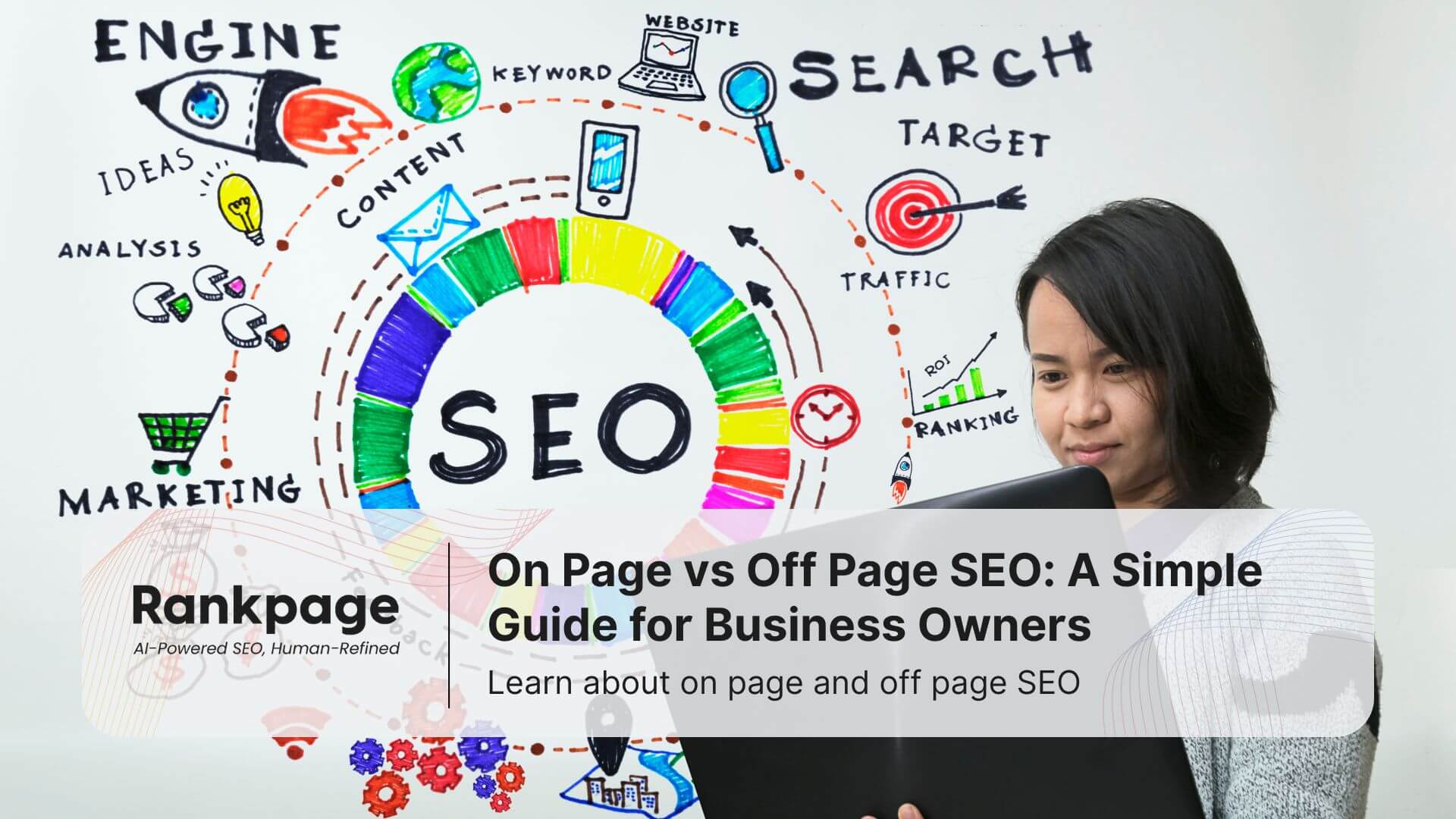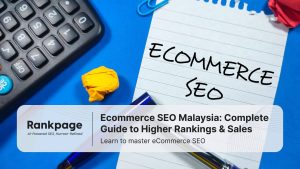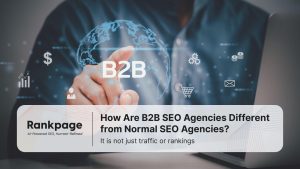Key Takeaways
- On Page SEO improves your website’s visibility and usability by fixing content, structure, and technical SEO basics.
- Off Page SEO builds trust and authority through backlinks, reviews, and online mentions.
- On Page SEO is your foundation; Off Page SEO is the amplifier that tells Google you deserve higher rankings.
- Both work together to grow search engine visibility, organic traffic, and customer conversions.
- Rankpage helps businesses balance website optimisation and link building strategies for real, lasting results.
On Page SEO is what you do on your own website to improve visibility while off Page SEO is what you do outside of your site to improve search rankings.
Sounds simple? Not really. If you’ve ever sat in an SEO agency meeting nodding politely while someone throws around words like “backlinks” and “schema markup” and “link equity” as if they were rapping, you’re not alone in this.
In Malaysia, business owners are already juggling long commutes, rising costs, and stiff competition. The last thing you need is confusing jargon when what you really want to know is: How do I get my website to bring in more customers?
This guide cuts through the noise and explains On Page vs Off Page SEO in plain English, and shows you how both can actually make a difference to your business growth.
Table of Contents
What Is On Page SEO?
On Page SEO is about everything you can control on your website.
It’s the first layer of SEO, making sure your site is easy to find, quick to load, and convincing once visitors land on it.
Elements of On Page Optimisation
Content optimisation
Every page on your site should answer customer questions clearly. This includes product descriptions, service pages, and blogs. For example, a Johor café that adds SEO keywords like “best kopi o in JB” into its menu page stands a better chance of showing up when someone Googles it.Technical SEO basics
A slow site frustrates visitors. Google knows this, which is why site speed optimisation is a huge ranking factor. Mobile-friendliness, web security, and structured data (schema markup) also play a big role. If your site takes longer than 3 seconds to load, expect customers to bounce.User experience (UX)
Clear menus, simple navigation, and strong Call-To-Actions (like “Book Now” or “Get a Quote”) are very important. Truth is, high rankings doesn’t matter if you can’t convert casual browsers to serious consumers, so this is important!
What Is Off Page SEO?
Off Page SEO is how the internet vouches for your business, at least for the most part.
While On Page SEO focuses on your website, Off Page SEO is about what others say about you online. Google looks at these external signals to decide how credible and trustworthy your business is.
Elements of Off Page Optimisation
Backlinks and authority
When a reputable site links to yours, it’s like a trusted neighbour recommending your business. A halal boutique shop in Petaling Jaya getting mentioned on The Star for example, gains instant authority.Brand reputation management
Reviews on Google Business Profile, TripAdvisor, or even Shopee matter. A 5-star review from a happy customer signals reliability to both Google and future customers. So try toOnline mentions
Being cited in media outlets, industry blogs, or local directories (like Malaysia SME Directory) reinforces your brand presence. A Klang Valley tech startup featured in The Edge earns more visibility and credibility.Social signals
Content shared on TikTok, Instagram, or LinkedIn boosts awareness, as more people would know your brand. Even though likes and shares aren’t direct ranking factors, they increase reach, and the chances of gaining links from others if people think your content is awesome.
On Page vs Off Page SEO: Comparison
Factor | On Page SEO (Website Control) | Off Page SEO (External Signals) | Example for Businesses |
Control | Fully within your website’s control | Relies on others linking or talking about you | Blog optimisation vs guest articles |
Focus | Content, site speed, UX, technical SEO basics | Backlinks, online reviews, brand reputation | Title tags vs Google Business reviews |
Timeline | Changes show results in weeks (faster indexing) | Results often take months (depends on outreach) | Meta updates vs media features |
Business Impact | Higher search engine visibility, better user experience | Builds trust, credibility, and stronger authority | Ranking for keywords vs domain authority gain |
Best Analogy | Your store’s design and customer experience | What people say about your store | Clean shop vs positive recommendations |
Which Should Businesses Focus On First?
Start with On Page SEO, then scale with Off Page SEO.
A mistake we see often is businesses rushing into backlinks or PR before fixing their own website.
If your site loads slowly, isn’t mobile-friendly, or the message isn’t clear, sending traffic there is like pouring water into a leaky bucket, the effort goes to waste.
For example:
A Malaysian retailer once spent heavily on link building strategies, hoping for quick wins. The clicks came in, but visitors bounced almost instantly. The site was slow, the layout confusing, and they couldn’t even get past the product page.
Once the business ran an SEO audit checklist, such as fixing speed, improving content, and adding structured data, things changed. Those same backlinks now had real impact, keeping visitors engaged and turning them into customers.
The lesson: Your on page SEO is the foundation. Once that’s solid, Off Page SEO becomes the amplifier that pushes your business higher in Google rankings.
Why Both Matter for Business Growth
Even in 2025, Google’s ranking factors still put heavy weight on both content quality (On Page) and authority signals (Off Page). Businesses that balance the two see real, measurable growth:
- Higher organic traffic growth that doesn’t rely on ads
- Stronger domain authority that holds rankings longer
- More qualified leads and conversions from visitors who trust what they see
Put simply: On Page SEO gets people in the door, Off Page SEO keeps them coming back because others are recommending you. You need both to compete.
“Google still considers content quality (on-page) and authority signals (off-page) as two of its most important ranking factors.” – Backlinko
Timeline: When to Expect Results
SEO is not instant noodles, it takes time to cook properly. Although this is not a strict time frame, most projects will go along this proven process.
SEO Focus | Timeline | What You’ll Notice | Local Example |
On Page SEO | 1–3 months | Faster indexing, higher clicks | KL law firm updates titles → ranks quicker |
Off Page SEO | 3–6 months+ | Authority growth, steady traffic | JB café earns backlinks/reviews → builds trust |
Combined | 6–12 months | Sustainable growth, more leads | Penang e-commerce site fixes UX + PR → steady sales |
Managing expectations is key. If someone promises results tomorrow, be cautious. Proper SEO is a long game that rewards consistency.
Read more: How Long Does SEO Take to Show Results? The Answer Will Surprise You
Common Myths About On Page vs Off Page SEO
Business owners hear a lot of SEO talk and with it, plenty of half-truths. Let’s clear up the biggest myths.
Myth 1: “Backlinks alone will skyrocket my rankings.”
Backlinks help, but without a strong website foundation, they’re wasted. Imagine paying for glowing reviews of your restaurant, only for customers to walk in and find broken chairs and no menu. Not a great look right?
Myth 2: “On Page SEO is just stuffing keywords.”
That trick died years ago. Today, it’s about creating content that answers real questions, with proper structure and clear user flow. Keyword stuffing is like shouting “best nasi lemak in KL” at every passerby, people will ignore you.
Myth 3: “Social media shares don’t matter.”
Not true, while likes and shares aren’t direct ranking factors, they do amplify your reach, which increases the chances of backlinks and brand mentions. Think of it as kopi tiam gossip, the more people talk, the more others want to try.
Tools and Resources to Streamline SEO
Leveraging the right tools can save you time and effort while boosting your SEO performance.
Instead of guessing what Google wants, these tools help you analyse, optimise, and track your SEO strategy more efficiently.
Semrush
Great for on-page SEO checks and backlink audits. For example, you can see if your business site is missing keywords or has weak backlinks.
Ahrefs
Excellent for keyword research and its Link Intersect tool (find out where your competitors are getting backlinks that you’re not).
Google Search Console
Free, powerful tool for performance monitoring and index coverage. It shows how your site performs in Malaysia searches and flags errors that stop you from ranking.
Yoast SEO or RankMath
WordPress plugins that simplify content optimisation. They give instant suggestions on readability, keyword placement, and meta descriptions.
For business owners, tracking performance and knowing where your SEO money is going is half the battle, the other half is finding an SEO agency that works for you.
On Page vs Off Page SEO: Why You Need Both
SEO isn’t about choosing sides. On Page SEO is your polished shopfront, Off Page SEO is your reputation. One gets customers through the door, the other convinces them to stay. Without both, growth stalls.
And while understanding the difference matters, actually doing it, fixing technical issues, creating content, building backlinks, managing reviews, takes time and expertise most business owners don’t have on their plate.
That’s where Rankpage comes in.
At Rankpage, we don’t just deliver quick fixes. We offer SEO services that balance on page optimisation with off page authority-building, customised to your business goals. From technical audits to expert link building, we help you earn visibility and trust that actually converts into customers.
Ready to stop guessing and start ranking?
Talk to Rankpage’s SEO specialists today and let’s build both visibility and credibility for your business.
Frequently Asked Questions About On Page vs Off Page SEO
What Is On Page SEO In Simple Terms?
On Page SEO is everything you do on your own website, content, speed, mobile, and structure, to help people and Google understand you.
What Is Off Page SEO In Simple Terms?
Off Page SEO is about building authority outside your site, such as backlinks, online reviews, and media mentions.
Which Is More Important For Ranking, On Page Or Off Page SEO?
Neither works alone. On Page makes your site visible; Off Page makes it credible. Both together drive rankings.
Do Small Businesses Need Off Page SEO?
Yes. Even if your website is well-optimised, without external credibility signals like reviews or backlinks, it’s harder to rank.
How Long Does It Take To See Results From On Page SEO?
Changes can show in weeks, but significant improvements usually take 3–6 months, depending on competition and strategy.
Can Rankpage handle both On Page and Off Page SEO for my business?
Yes. Rankpage runs audits, fixes technical issues, optimises content, and builds authority through safe, ethical Off Page strategies.





